Social Protection
Context
The State of the World’s Cash 2020 report found:
- Working with, through and alongside social protection systems is now considered key to strengthening the humanitarian-development nexus and humanitarians are increasingly active in this space
- Practitioners find that the three biggest challenges to effective linkages are: (i) lack of coordination between the actors involved, (ii) social protection systems are not designed to respond to crises, (iii) humanitarian practitioners lack expertise in social protection
- Critically, there is no ‘one size fits all’ solution to linking CVA and social protection. Trade-offs between efficiency, effectiveness, accountability, and sustainability must be considered to ensure the best outcomes for people living in crisis and depends on context, existing systems, and timeframe. Linking will not always be appropriate and social protection systems may not meet all needs. In many contexts, in the short to medium term at least, humanitarian programming will be required to fill gaps.
Current Priorities
The CALP Network has invested intensely in this thematic area over the last few years. We will continue to work closely with the SPIAC-B Working group on linking humanitarian (cash) assistance and social protection (formerly the Grand Bargain Sub-Workstream on Social Protection) and with the SocialProtection.org platform and the Online Community Social Protection in Crisis Contexts to develop evidence, produce capacity building materials and provide technical support to coordination actors.
Community of Practice
SocialProtection.org hosts a dynamic and collaborative online community of practice (CoP) bringing together individuals from diverse backgrounds interested in expanding social protection in crisis-prone areas. The CoP offers a space to exchange documents, insights, and news in order to progress and learn together. Its inclusive and member-led approach offers organisations and individual members a forum to increase learning and outreach, facilitating the exchange of experiences and expanding knowledge. A discussion group hosted by dgroups.org complements these activities by connecting users rapidly via email.
SPACE
There are a wealth of relevant resources from ‘Social Protection Approaches To Covid-19: Expert Advice’ (SPACE) published in the CALP library.
Featured content

Linking Social Protection and Humanitarian Cash and Voucher Assistance
Report
There is a growing momentum and body of work around the idea of developing stronger links between humanitarian cash and voucher assistance (CVA) and social protection (SP). This Briefing Paper for the CALP Network, based on a literature review, a survey, and interviews, is intended to inform the CALP Network’s overall approach in this area, and subsequently its capacity building and...

Linking Social Protection and Humanitarian Cash
Blog Post
The case for social protection to help people cope with shocks has always been clear and never more obvious than during the current Covid-19 crisis. These issues are currently playing out in real time as governments, donors and aid agencies scramble to find ways to get more help to more people to cope with the economic consequences of illness and lockdown. As the virus starts to take hold in...

Linking Social Protection and humanitarian cash and voucher assistance (CVA) – what do we really know and where to start? Findings from the CALP Network commissioned high level briefing paper at the time of COVID-19
Webinar
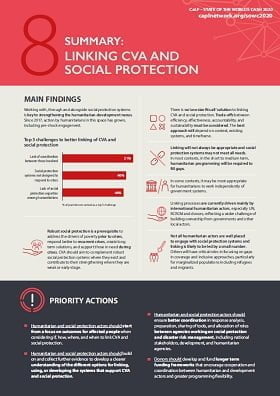
State of the World’s Cash 2020 Chapter 8 summary: Linking CVA and social protection
Report
Longstanding efforts to strengthen links between humanitarian CVA and social protection have been accelerated by the COVID-19 pandemic, with significant progress since the last report. CVA should aim to complement robust social protection systems where they exist and contribute to their strengthening where they are weak or early-stage. This chapter asks: ‘What opportunities and challenges...
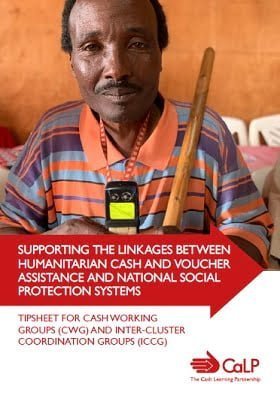
Supporting the Linkages Between Humanitarian Cash and Voucher Assistance and National Social Protection Systems
Report
This tipsheet aims to support country-level coordination efforts to strengthen the engagement between humanitarian coordination groups that implement cash and voucher assistance (CVA) and existing social
protection or disaster risk reduction coordination actors and groups. In particular, it seeks to offers inter-cluster and cash working group coordinators simple practical tips for engaging...
Case Studies

Linking CVA and Social Protection in the MENA Region – Crib sheet
Report
Building linkages between humanitarian cash and voucher assistance (CVA) and social protection (SP) has become an increasingly prominent topic over the past five years and the Middle East and North Africa (MENA) region has been at the centre of this evolution. The objective of this resource set (the crib sheet and 3, soon to be 6, regional case studies) is to ensure that the CALP Network...
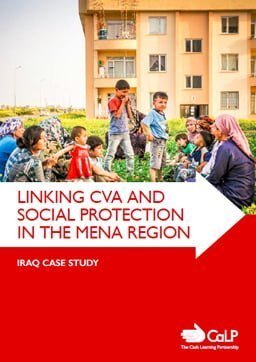
Linking CVA and Social Protection in the MENA Region – Iraq Case Study
Report
Building linkages between humanitarian cash and voucher assistance (CVA) and social protection (SP) has become an increasingly prominent topic over the past five years and the Middle East and North Africa (MENA) region has been at the centre of this evolution. The objective of this resource set (the crib sheet and 3, soon to be 6, regional case studies) is to ensure that the CALP Network...

Linking CVA and Social Protection in the MENA Region – Lebanon Case Study
Report
Building linkages between humanitarian cash and voucher assistance (CVA) and social protection (SP) has become an increasingly prominent topic over the past five years and the Middle East and North Africa (MENA) region has been at the centre of this evolution. The objective of this resource set (the crib sheet and 3, soon to be 6, regional case studies) is to ensure that the CALP Network...
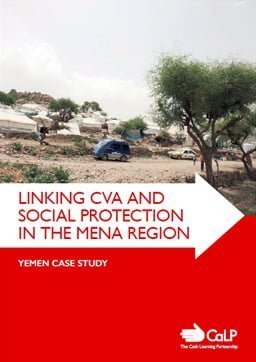
Linking CVA and Social Protection in the MENA Region – Yemen Case Study
Case Study
Building linkages between humanitarian cash and voucher assistance (CVA) and social protection (SP) has become an increasingly prominent topic over the past five years and the Middle East and North Africa (MENA) region has been at the centre of this evolution. The objective of this resource set (the crib sheet and 3, soon to be 6, regional case studies) is to ensure that the CALP Network...

Linking Cash and Voucher Assistance (CVA) and Social Protection – Occupied Palestinian Territories (OPT): Country Summary
Report
This country summary is part of a larger resource set, providing practitioners with examples of different approaches to linking CVA
and social protection.
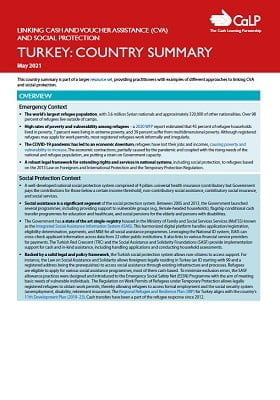
Linking Cash and Voucher Assistance (CVA) and Social Protection – Turkey: Country Summary
Report
This country summary is part of a larger resource set, providing practitioners with examples of different approaches to linking CVA
and social protection.
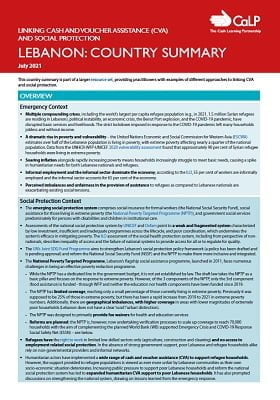
Linking Cash and Voucher Assistance (CVA) and Social Protection – Lebanon: Country Summary
Report
This country summary is part of a larger resource set, providing practitioners with examples of different approaches to linking CVA
and social protection.
Thematic lead
Latest
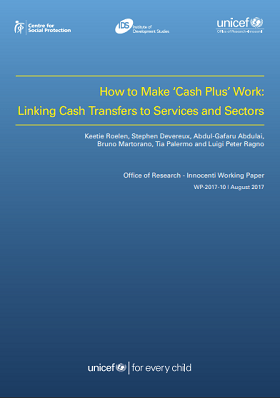
How to Make ‘Cash Plus’ Work: Linking Cash Transfers to Services and Sectors
Report
The broad-ranging benefits of cash transfers are now widely recognized. However, the evidence base highlights that they often fall short in achieving longer-term and second-order impacts related to nutrition, learning outcomes and morbidity.In recognition of these limitations, several ‘cash...

Madagascar Cash in Emergency Principles
Guidelines and Tools
To improve coordination at technical and strategic levels, an emergency cash group was formed in 2016 under the overall umbrella of the Social Protection Thematic Group which was co-led by UNICEF and the Ministry in charge of social protection. This has strengthened coordination amongst partners; improved...

Shock-Responsive Social Protection Systems Research Case Study: Pakistan
Report
This case study presents an overview of the social protection disaster risk management and humanitarian systems in Pakistan, and discusses both Pakistan’s flagship social protection programme, the Benazir Income Support Programme (BISP), as well as emergency cash transfers provided as disaster...
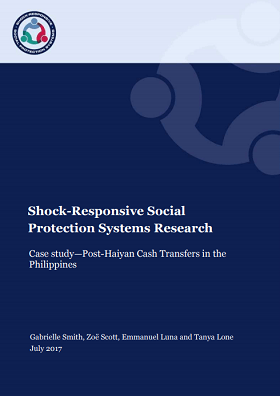
Shock-Responsive Social Protection Systems Research Case study—Post-Haiyan Cash Transfers in the Philippines
Report
This case study report focuses specifically on the experiences of using emergency cash transfers following Typhoon Haiyan and considers the wider social protection system, developments since Haiyan and future possibilities for shock-responsive social protection. A summary briefing note is published...

Challenging the System: Humanitarian Cash Transfers in Iraq
Report
Cash transfers have been used in Iraq to meet the critical basic needs of a highly vulnerable population, providing them dignity and flexibility in a context of uncertainty and economic need. Although Iraq is an appropriate context for the use of cash transfers, factors including government acceptance,...

Building on social protection systems for effective disaster response: the Pakistan experience
Report
How can social protection systems be used in disasters, as a complement to, or substitute for, humanitarian assistance? Oxford Policy Management (OPM) led a two-year research project investigating this question, looking at the role of social protection in both mitigating the impact of large-scale shocks...

Responding to Drought in Kenya Using Cash and Vouchers: Learning from Previous Responses
Report
This paper provides a summary of 100 recommendations, lessons and observations from evaluations that have looked at the use of cash and vouchers in drought responses in Kenya. The reports which were reviewed considered the use of cash and vouchers in drought related responses in urban and rural areas;...
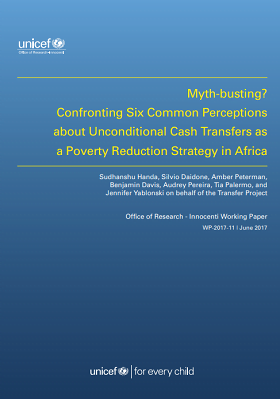
Myth-busting? Confronting Six Common Perceptions about Unconditional Cash Transfers as a Poverty Reduction Strategy in Africa
Report
This paper summarizes evidence on six perceptions associated with cash transfer programming, using eight rigorous evaluations conducted on large-scale government unconditional cash transfers in sub-Saharan Africa, under the Transfer Project. Specifically, it investigates if transfers: 1)...
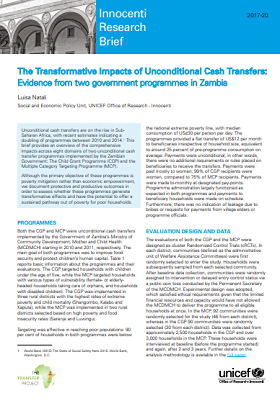
The Transformative Impacts of Unconditional Cash Transfers: Evidence from two government programmes in Zambia
Report
Unconditional cash transfers are on the rise in Sub-Saharan Africa, with recent estimates indicating a doubling of programmes between 2010 and 2014.This brief provides an overview of the comprehensive
impacts across eight domains of two unconditional cash transfer programmes implemented by the...

The use of CTP in Kenya: Reflecting on the 2016/17 Drought Response
Report
This workshop report is packed with useful ideas and information, reflecting the lively discussions which took place at a workshop in June 2017 about the use of CTP in the Kenya drought response. Discussions touched on multiple issues including coordination; cash transfer values; lack of awareness...

Scaling-up CTP in Somalia: Reflecting on the 2017 Drought Response
Report
This report summarises discussions that took place during a half-day workshop in September 2017. It built on issues identified as needing action in May, as outlined in the ‘Looking back to move forward: Building on learning from 2011 to strengthen the 2017 drought response in Somalia learning report’.

A buffer against the drought
Report
The Government of Kenya in partnership with DFID undertake a long term social protection program(Hunger Safety Net Program) in Northern Kenya reaching out to poor households with bi monthly cash transfers. So much investment has been put in this program including pre-registration and carding of...

Cash Tranfers for Food Security in Epidemics. A Review of the USAID Food for Peace Response to the Ebola Crisis in Liberia and Sierra Leone
Case Study
Over the course of 2015 and 2016, the United States Agency for International Development/Food for Peace (USAID/FFP)-funded cash transfer programming (CTP) in Liberia and Sierra Leone reached over 500,000 crisis-affected people with a vital lifeline to tackle food insecurity. Monitoring data indicates that...

Profiling of caseload in need of cash-based interventions Results
Report
At the request of the Inter Sector Working Group in Gaziantep, the Case Management Task Force and the Protection Working Group, the Cash-Based Interventions Technical Working Group (CBI TWG) produced this “Cash Gap Analysis”. The analysis aimed to profile the refugee population in Turkey who require...

A promise of tomorrow.The effects of UNHCR and UNICEF cash assistance on Syrian refugees in Jordan
Report
Despite the generous hosting by the Government and people of Jordan of Syrian refugees, more than 650,000 registered Syrian refugees in the country, continue to face a highly uncertain future. They cannot go home, given the ongoing conflict and insecurity in Syria; many of the most vulnerable struggle to...
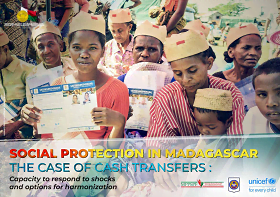
Social protection in Madagascar – The Case of Cash Transfers: Capacity to respond to shocks and options for harmonization
Report
The report has been prepared as commissioned by the Government of Madagascar (Ministry of Population, Social protection and Women’s Promotion and the National Office of Risk and Disaster Management) in coordination with the members of the emergency cash group and with UNICEF’s funding and technical...

Cash for Education: A global review of UNHCR programmes in refugee settings
Report
This review provides an overview of the use of cash assistance in 45 cash-related education programmes in 21 UNHCR operations. It highlights the key opportunities and challenges with the use of cash for education and provides key direction for future programming and related protection considerations....

Can Conditional Cash Transfers improve the uptake of nutrition interventions and household food security? Evidence from Odisha’s Mamata scheme
Report
There is considerable global evidence on the effectiveness of cash transfers in improving health and nutrition outcomes; however, the evidence from South Asia, particularly India, is limited. In the context of India where more than a third of children are undernourished, and where there is considerable...
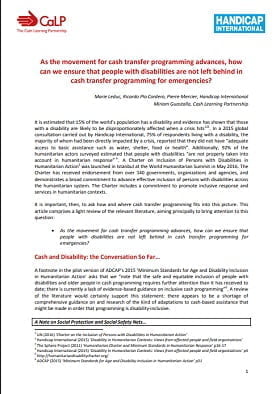
As the movement for cash transfer programming advances, how can we ensure that people with disabilities are not left behind in cash transfer programming for emergencies?
Report
It is estimated that 15% of the world’s population has a disability and evidence has shown that those with a disability are likely to be disproportionately affected when a crisis hits. In a 2015 global consultation carried out by Handicap International, 75% of respondents living with a disability, the...

Evaluation of the Kenya Hunger Safety Net Programme Phase 2
Report
The report summaries key findings from Hunger Safety Net Programme Phase 2 Qualitative impact study conducted in August 2016. The report integrates interesting infographics that depict the findings in an easy to read and understand format

